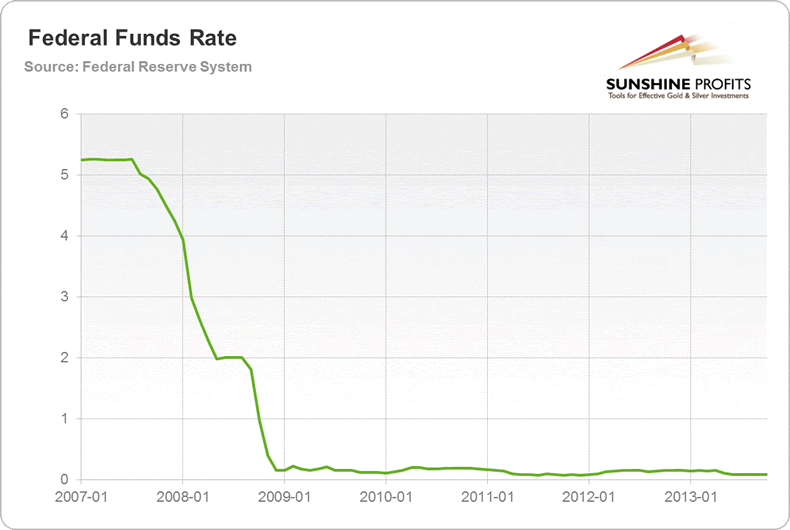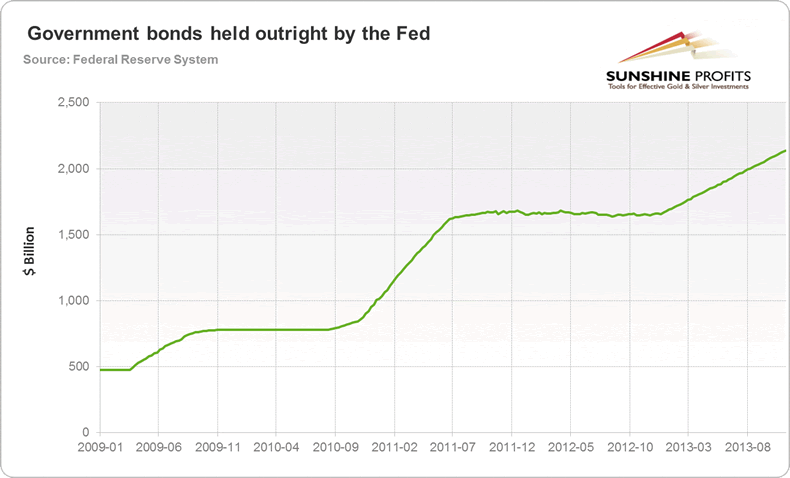QE Tapering vs. Tightening Issue Continued
Interest-Rates / Quantitative Easing Dec 23, 2013 - 04:29 PM GMTBy: Matt_Machaj
 Last week all (investors') eyes were on the Fed, and the Fed delivered. A small (if you can call $10 billion "small", but it is on a relative basis) form of tapering of the Quantitative Easing program was announced and markets reacted to it. It turned out that our assumptions about investors' expectations were correct - they were expecting to see no tapering and they were surprised by it.
Last week all (investors') eyes were on the Fed, and the Fed delivered. A small (if you can call $10 billion "small", but it is on a relative basis) form of tapering of the Quantitative Easing program was announced and markets reacted to it. It turned out that our assumptions about investors' expectations were correct - they were expecting to see no tapering and they were surprised by it.
As mentioned previously, even though tapering and tightening are often viewed as synonyms, they are exactly the same thing. Let's discuss this more thoroughly.
Tapering and tightening are rightly interpreted as backing out from two distinct expansionary tools. Even though those two tools have similar effects on the market interest rates, they are not viewed as equivalent. Moreover, as Bernanke willingly admitted, the Federal Open Market Committee does not know the exact consequences of long term asset purchases (therefore contrary to Dennis Lockhart's - Federal Reserve Bank of Atlanta - claim it is not easy to understand when the economy is "ready" for backing out). As he softly stated apparently they are "somewhat less certain about the magnitudes of the effects on financial conditions and the economy of changes in the pace of purchases or in the accumulated stock of assets on the Fed's balance sheet".
Let us look closer than on those two different tools that Fed used to bring down longer term interest rates. First the conventional tool, short-term interest rates, which started being reduced after the first symptoms of the coming recession:

As fast as Bernanke took office and started rising the interest rates he had to start lowering them after the holiday season in 2007. The hit in 2008 and the Lehman fall only perpetuated the trend. In 2009 the Fed gladly and proudly started to walk in the world of near zero interest rates (negative real interest rates, the same diseases as the one that initially caused 2007-8 trouble). As you easily see, this "temporary" tool has become almost permanent as in the case of Japan. Interest rates are not moving anywhere soon. No "tightening" should be expected, since all the inflation hawks emigrated to parts unknown.
Now let us look at the second tool, asset purchases. As stated above it should be dehomogenized from the interest rate policy, since it is a different tool, and the Fed has a lot of uncertainty about what it does. But let us dehomogenize this tool even further. Let us divide asset purchases by the Fed into two distinct categories: longer term government securities purchases and mortgage backed securities purchases. Here is the government chart:

As soon as we walked into 2009 the Fed started to back up the Treasury by buying more bonds (interestingly in 2008 the Fed was reducing government bonds holding to put them into banks' hands, since these were almost literally the only "safe" securities one could hold on to at the time). As you clearly see there was no reduction in government bond holding since 2009 - this will be important when we contemplate tapering issues in the next section.
The nature of this move was good old monetary printing program in favor of the government. Quite frankly let us forget about all this central bank independence talk. Here it is. Since 2009 the monetary printing press has been spinning in order to bid up government bonds, to bring down real returns on them, so the government can receive extra created money in order to spend it for political benefactors.
Of course an increase in asset holding is not smooth and steadily increasing. No doubts we will have some slowdowns, but no reverse movements. From 500 billion dollars in 2009 to over 2 trillion dollars at the end of 2013.
Things look slightly different in case of commercial assets held at the central bank. As we've discussed in the recent Market Overview (on which this article is based), a sort of "tapering" in the commercial assets held by the Fed already happened. Therefore in case it should happen again it needs not change much in the current economic circumstances.
If we consider that only half of last week's tapering meant a decrease in bond purchases, then the final effect is indeed quite small as far as the overall approach is concerned, and the stability of the dollar system. Consequently, over the long run the outlook for gold remains bullish, even if we see a decline in the next few weeks.
Thank you.
Matt Machaj, PhD
Sunshine Profits‘ Contributing Author
Gold Market Overview at SunshineProfits.com
* * * * *
Disclaimer
All essays, research and information found above represent analyses and opinions of Matt Machaj, PhD and Sunshine Profits' associates only. As such, it may prove wrong and be a subject to change without notice. Opinions and analyses were based on data available to authors of respective essays at the time of writing. Although the information provided above is based on careful research and sources that are believed to be accurate, Matt Machaj, PhD and his associates do not guarantee the accuracy or thoroughness of the data or information reported. The opinions published above are neither an offer nor a recommendation to purchase or sell any securities. Matt Machaj, PhD is not a Registered Securities Advisor. By reading Matt Machaj’s, PhD reports you fully agree that he will not be held responsible or liable for any decisions you make regarding any information provided in these reports. Investing, trading and speculation in any financial markets may involve high risk of loss. Matt Machaj, PhD, Sunshine Profits' employees and affiliates as well as members of their families may have a short or long position in any securities, including those mentioned in any of the reports or essays, and may make additional purchases and/or sales of those securities without notice.
© 2005-2022 http://www.MarketOracle.co.uk - The Market Oracle is a FREE Daily Financial Markets Analysis & Forecasting online publication.



